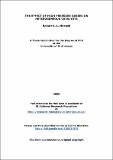The effect of high pressure gasses on heterogeneous catalysts
Abstract
Several heterogeneously catalysed reactions have been studied at
pressures above and below the critical pressure of carbon dioxide in both carbon
dioxide and nitrogen. The purpose of this study was to ascertain if carbon
dioxide above its critical pressure and temperature would have a beneficial effect
on the active life time of the catalysts
When the Beckmann rearrangement of cyclohexanone oxime was studied
it was discovered that using carbon dioxide above its critical pressure and
temperature was beneficial to catalyst lifetime at both 250°C and 300°C,
however the beneficial effect was also observed in nitrogen under the same
conditions. It is proposed that the benefits at higher pressures are due to an
increased residence time in the reactor or increased competition for active sites.
When the process was performed at 380°C, a previously unreported impurity was
observed in the collected samples. This was shown to be N-ethyl caprolactam, it
is proposed that this is formed by a Ritter style reaction with 5-cyanopent-1-ene
known to be formed during the reaction
When the Fries rearrangement of phenyl acetate was studied it was
discovered that increasing reactor pressure appeared to have little or no effect on
the catalyst; it is thought this is because the reaction temperature of 150°C is below the boiling point of phenyl acetate, and that the reaction being observed
occurs purely in the liquid phase.
When the Diels-Alder addition of isoprene to methyl acrylate was
studied, it was discovered that using carbon dioxide above its critical pressure
had the effect of improving catalyst lifetime and conversion to desired product,
with the greatest effect being at 50 bar. It was discovered that using nitrogen
under the same conditions led to a greater improvement in conversion and
catalyst lifetime. It is thought that the reactions in carbon dioxide are in a near
critical state at 50 bar leading to the maximum effect at this pressure, and at
higher pressures the reactions are bi- or multi-phasic, leading to the decrease in
the effect.
In the process of studying the above reactions an effective rig for the
study of high pressure heterogeneously catalysed reactions was built.
Type
Thesis, PhD Doctor of Philosophy
Collections
Items in the St Andrews Research Repository are protected by copyright, with all rights reserved, unless otherwise indicated.

